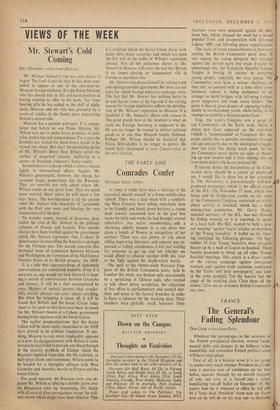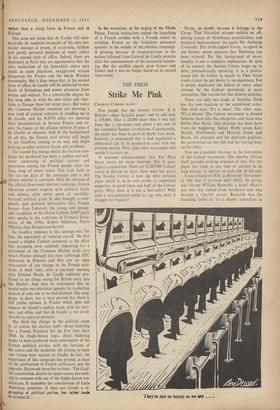FRANCE
The General's Fading Splendour
DON COOK. writes from Paris: Whatever the percentages in the outcome of the French presidential election, several funda- mental shifts and changes in the hitherto rather monolithic and somnolent French political scene will have taken place.
First of all, in a historic sense it is not going to matter very much whether President de Gaulle wins a massive vote of confidence on the first ballot, squeaks through by an overall majority of only one vote, or is forced into a rather humiliating run-off ballot on December 19. No matter how he is returned to office he will still be a 'lame duck President' from now on. From now on he will be on his way out—a declining rather than a rising force, in France and in Europe.
This does not mean that de Gaulle will auto- matically be rendered incapable of his own par- ticular exercise of power, of autocratic, ruthless and purely personal decisions of major policy in his second term of office. Indeed, there are diplomats in Paris who are apprehensive that the very realisation of his lame-duck status may result in some impulsive, exaggerated actions dangerous for France and the whole Western community. But it does mean that, in his second term of office, de Gaulle will be subjected to new kinds of limitations and power pressures from within and without. To a remarkable degree, he has been able to write his own ticket and time- table in Europe these last seven years. But today the Common Market countries are showing a new kind of cynical cohesion in standing up to de Gaulle, and his. NATO allies are showing their determination to by-pass France and en- sure the future of the alliance without France if de Gaulle so chooses. And in the background of all this, the French civil service will begin to see Gaullism coming to its end, and begin looking to other political forces and problems.
The second big change which the election cam- paign has produced has been a sudden and wel- come awakening of political interest and awareness among the French people after the long sleep of seven years. This took hold in the last ten days of the campaign and is due utmost entirely to television. With the opening of the official three-week election campaign, French television screens erupted with political battle and debate, after seven years of carefully- strained political gruel. It also brought a com- pletely new political personality into French homes—Jean Lecanuet, the young and person- able candidate of the liberal Catholic MRP party who speaks in the traditions of France's Euro- peans of the ,1950s, Robert Schuman, Pierre Pflimlin, Jean Monnet and the rest.
De Gaulle's response to this upsurge was, for him, the equivalent of 'running soared.' He first issued a delphic Cabinet statement to the effect that prospects were suddenly improving for a settlement of the Common Market crisis into which France plunged last June (although EEC diplomats in Brussels said they saw no signs whatsoever of any change in the French posi- tion). A week later, after a one-hour meeting With Edward Heath, de Gaulle suddenly pro- fessed to see things easing for British entry into the Market. And then he announced that he would make two television appeals for re-election instead of only one as he had planned. The cam- paign, in short, has at least proved that there is still public opinion in France which does not support de Gaulle's endless feuds with his part- ners and allies, and that de Gaulle is not invul- nerable to political pressure.
The third big change in the political scene is, of course, the election itself—direct balloting for a French President for the first time since 1848. In Anglo-Saxon logic, direct balloting ought to have produced some polarisation of the French political parties, with the factions of the centre and the moderate left joining to back one 'strong man' against de Gaulle. In fact, the experience of this campaign has proved, at least to the satisfaction of French politicians, just the opposite. Raymond Aron has written : 'The Gaul- list constitution, despite its appearances, has noth- ing in common with any of the Anglo-Saxon con- stitutions. It resembles the constitutions of Latin American oountries. It does not favour a re- grouping of political parties, but rather tends to prevent it.' In the meantime, at the urging of the Elysee Palace, French technicians rushed the launching of a French satellite with a French rocket to establish France as the Iroisieme puissance spatiale' in the middle of the eleCtion campaign. A glowing message of congratulations to the nation followed from General de Gaulle minutes after the announcement of the successful Launch- ing. But the satellite signals grew fainter and fainter and it was no longer heard on its second time round.







































 Previous page
Previous page